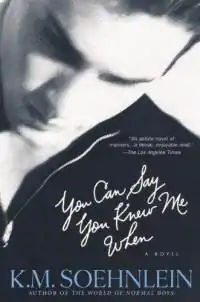 | |
| Author | K.M. Soehnlein (Karl Soehnlein) |
|---|---|
| Country | United States |
| Language | English |
| Genre | Gay fiction |
| Published | 2005 (Kensington Books) |
| Media type | Paperback and hardback |
You Can Say You Knew Me When is a novel by K.M. Soehnlein (Karl Soehnlein) following his best seller The World of Normal Boys.
Plot
A thirty-something San Francisco gay radio journalist Jamie Garner reluctantly returns to his childhood home of Greenlawn, New Jersey, and discovers secrets from his dead father's sexual past, including photos with a friend actor Dean Foster and entourage of Jack Kerouac all covered by a 40-year secrecy. Upon his return to San Francisco, Jamie though trying desperately to maintain a monogamous relationship with his venture-capitalist boyfriend Woody, falls into a series of promiscuous relations after a hurried sexual encounter with a man in the rest room of Newark airport. For all his faults, Jamie, a sympathetic, often frustrating character tries to make peace with his father's deep-seated prejudices toward his sexuality and come to terms with his father's mysterious long-ago alternative life.
Reviews
The novel has received mainly positive feedback, making it onto many lists such as Goodreads.[1] The novel has been widely praised for the tackling of sexuality and acceptance, with special focus upon the scene building in 1990s San Francisco.[2] The San Francisco chronicle summarized it as ""Engaging . . . the flow and intensity of the writing make it difficult to put Soehnlein's book down . . . With remarkably stylish and witty prose, Soehnlein keeps the reading convincing and compelling, displaying a knack for giving just enough detail to put the reader right in the scene."[3]
References
- ↑ "You Can Say You Knew Me When". www.goodreads.com. Retrieved 2019-12-03.
- ↑ "You Can Say You Knew Me When -- book review". www.curledup.com. Retrieved 2019-12-03.
- ↑ "You Can Say You Knew Me When by K M Soehnlein". www.fantasticfiction.com. Retrieved 2019-12-03.
External links